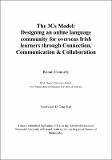The 3Cs model: Designing an online language community for overseas Irish learners through connection, communication and collaboration

View/
Date
2021-09Embargo Date
2025-02-08
Author
Connolly, Ronan
Metadata
Show full item recordUsage
This item's downloads: 0 (view details)
Abstract
The Irish language is currently classified as “definitely endangered” (Moseley, 2010) and
may die out as a vernacular within a decade in the Irish-speaking regions of Ireland (Ó
Giollagáin & Charlton, 2015). This trend contrasts with a significant interest in learning Irish
outside of Ireland, particularly in the USA (Hickey & Stenson, 2016).
In 2017, the author conducted a survey with 92 respondents to identify the needs of Irish
language learners living outside of Ireland. Findings indicated that overseas Irish learners
were interested in engaging in an online Irish language community. A subsequent literature
review suggested that an online community of practice founded on connectivist principles,
utilising a communicative language approach and collaborative activities, could provide
increased opportunities for overseas Irish learners to increase their language confidence.
Positioned in the context of similar developments and innovations internationally (e.g. Henry
et al., 2018), this research builds on existing literature in online sociocultural L2
development.
This Design-Based Research (DBR) study encompassed four iterative cycles of design,
implementation and testing, and redesign. Each design cycle utilised a learner-centred
approach through Task-Based Language Learning and conversational practice. Each iteration
utilised a theoretically-informed design approach, the 3Cs Theoretical Framework, to
systematically explore the development of an online language community founded on the
principles of connection, communication and collaboration.
In this four-year study, data were collected from over 700 participants worldwide who
engaged with the needs survey and four design cycles. Quantitative and qualitative data were
gathered using surveys, interviews and focus groups. The data derived from each design
cycle were the subject of critical analysis framed by the 3Cs Theoretical Framework. The
components of the educational intervention were refined following each iteration in order to
optimise participants’ authentic language development, while simultaneously generating
design principles adaptable to similar online language communities.
This thesis contributes to the understanding of online learning environments for endangered,
minority and indigenous language communities in three ways. Firstly, the research
establishes the potential of an online Irish language community to facilitate and foster
language development among learners living beyond Ireland. Secondly, through the detailed
articulation of a longitudinal and repeatable DBR process, the thesis demonstrates how an
online social language learning intervention was designed and implemented for an online
language community. Thirdly, the thesis contributes to advancing design research by
producing the 3Cs Model for Online Language Communities, and a series of theoretical
contributions, which can be utilised by educators to support similar groups endeavouring to
preserve, protect and promote less spoken languages.

